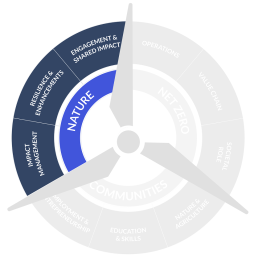What is the issue and why is it so important?
The clean energy transition is accelerating, with renewables projected to power nearly 90% of global electricity generation by 2050, up from 29% in 2020. This transformation is essential to tackling the climate crisis, reducing emissions, and advancing the net zero agenda. However, the scale and pace of this transition come with significant challenges- and opportunities- for nature and biodiversity.
The rapid deployment of renewable energy infrastructure requires substantial land and sea area, presenting risks to ecosystems if not managed responsibly. Poorly planned projects can disrupt habitats, impact biodiversity, and place undue strain on already vulnerable ecosystems. Equally, this offers an unprecedented chance to align climate action with environmental restoration, creating a nature-positive pathway that benefits both people and the planet.
We aim to achieve a Net Positive impact on Nature for our direct operations, and our ambition is underpinned by three focus areas

Impact Management
We aim to enhance the resilience of Rezolv’s business and locations by restoring and regenerating nature. Work here again is centered around our BAPs which are produced in line with exacting IFC requirements.
Resilience & Enhancements
We work to avoid and reduce negative impacts on nature where possible. Measures here include project-level biodiversity action plans (BAPs) to measure, manage and monitor our impact.
Engagement & Shared Impact
We strive to push nature up the agenda and drive positive impact through partnerships, advocacy, research, engagement and innovation. Addressing the nature crisis requires system-level collaboration
Work to date and next steps
We strive to push nature up the agenda and drive positive impact through partnerships, advocacy, research, engagement and innovation. Addressing the nature crisis requires system-level collaboration.
Building out our nature strategy
During 2024, we have identified our focus areas and a headline ambition for nature. In 2025, we will deepen our understanding and operationalise our nature strategy by integrating corporate-level action plans with the groundwork laid by our project-level commitments.
EIAs and BAPs
Through project-level Environmental Impact Assessments (EIAs) and Biodiversity Action Plans (BAPs), Rezolv has made significant commitments to nature at its sites. These include ensuring no net loss- and for priority sites, net gain- in biodiversity through advanced species protection measures, habitat restoration, and community involvement.
Stakeholder engagement
We continue to engage with local communities, biodiversity experts, and other stakeholders through consultation processes to align our efforts with their priorities and insights. This collaborative approach ensures that our projects contribute meaningfully to both biodiversity conservation and local livelihoods.